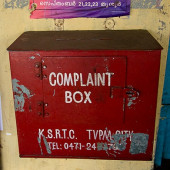Our website uses cookies so we can analyse our site usage and give you the best experience. Click "Accept" if you’re happy with this, or click "More" for information about cookies on our site, how to opt out, and how to disable cookies altogether.
We respect your Do Not Track preference.

At the Office of the Privacy Commissioner, we deal with a lot of complaints. I mean a LOT. The complaints are about everything you can imagine, from collection, to security, to retention, to disclosure of personal information.
We have a highly trained team of investigating officers ready to help resolve these complaints using a range of tools.
In the past, our office has been relatively legalistic in its approach. There have been lots of letters back and forth, and legal arguments. This has worked for a lot of our complainants and respondents; I think it is a fairly basic human need to feel like you’ve had your “day in court”.
But we’re exploring new paths for progress.
All over the world, there is a movement towards different type of dispute resolution. This is a move away from a rights based (legal) approach towards an interests based approach.
We need to recognise that even where there has been an interference with privacy, there may be a relationship that needs to continue. Even if there is no relationship to save, there may simply be a quicker, easier and more effective way than everyone acting like Denny Crane (see Boston Legal).
So our investigations team is moving into the new frontier of – wait for it… TALKING TO PEOPLE!
The dispute resolution methods we use include shuttle negotiation, teleconferences, face to face meetings, conciliations, right through to full blown mediations and compulsory settlement conferences. Don’t worry, this isn’t some patchouli scented, hand holding “tell me about your feelings” session, we are here to resolve complaints, fairly, efficiently and effectively.
We have a section in the Privacy Act that we can use as a way of both settling a complaint or simply getting the parties to front up and tell us what’s going on. Section 76 really relates only to bringing both parties in for a facilitated discussion. But we can also use section 91(1) to call any person - a party to a complaint, or a third party - to come and give us information. We think its pretty common sense stuff.
We received a complaint where a father believed his daughter’s school had refused him access to all the information it held about them. This could have taken months to resolve. Instead, we sent an investigations officer down to the school, and went through the files with the principal and the chair of the board of trustees. We had a discussion about what information the father was entitled to, and what responsibilities the school had to protect the privacy of the other students involved in the situation.
The investigator then met with the father, handed over the files in person, and was able to give an absolute assurance that he now had absolutely everything he was entitled to. The file was resolved and not a single legal letter written.
What about the example of an access request made to a government agency over a year ago? There were pages and pages of correspondence, and hours and hours of work - for us, the agency involved and the complainant. The Commissioner got wind of the complaint, we met with the agency, and the files were handed over within a week.
We understand that being called in to a “compulsory conference” might not be everyone’s favourite thing. But this is an opportunity for parties to have their say to a real human being. We think there is real value in that and if it resolves a complaint faster, it has got to be a good thing.
Back